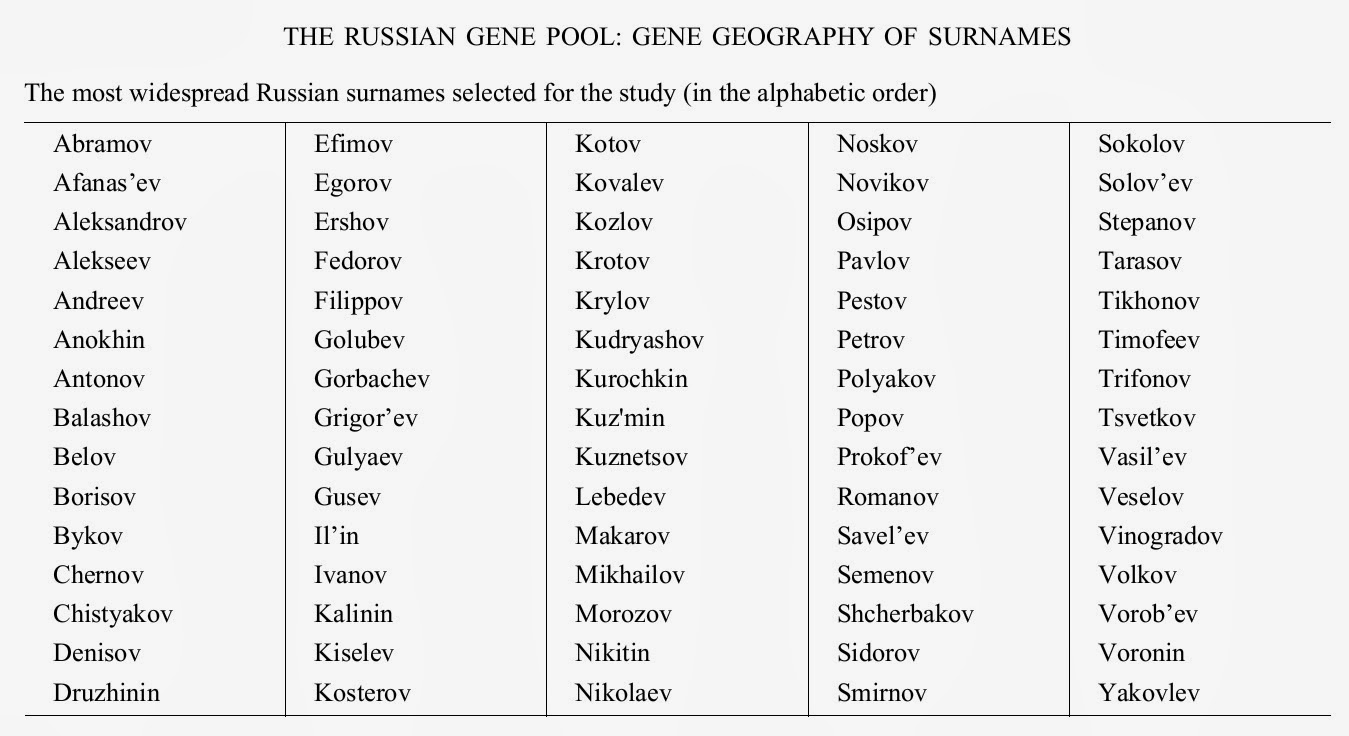Common Russian last names reflect the rich cultural heritage and history of Russia. Understanding these surnames is essential for anyone interested in Russian culture, genealogy, or linguistics. The significance of last names in Russian society goes beyond mere identification; they often carry information about lineage, profession, and even geographic origin.
In this article, we will delve into the most common Russian last names, their meanings, and their historical context. We will also explore how these names are formed and what they reveal about Russian society. Whether you are researching your ancestry or simply curious about Russian names, this guide will provide you with valuable insights.
By the end of this article, you will have a better understanding of common Russian last names and their relevance in today's world. Let's embark on this fascinating journey through the world of Russian surnames!
Table of Contents
- Understanding Russian Last Names
- Historical Context of Russian Surnames
- Common Russian Last Names
- Meanings of Common Russian Last Names
- Significance in Russian Society
- Data and Statistics
- Conclusion
- Resources
Understanding Russian Last Names
Russian last names are typically patronymic, meaning they are derived from the given name of an ancestor, usually the father. This tradition is deeply rooted in Russian culture and often provides insights into family lineage. For instance, the surname Ivanov signifies "son of Ivan," while Petrov means "son of Peter." This structure is a reflection of the importance of family and ancestry in Russian society.
In addition to patronymic names, many Russian surnames also have occupational or geographic origins. For example, the surname Kuznetsov is derived from the word "kuznets," meaning "blacksmith." Similarly, names like Volkov (wolf) or Sokolov (falcon) often indicate a connection to nature or local fauna.
Historical Context of Russian Surnames
The history of Russian surnames dates back to the 13th century, but it was not until the 17th century that their use became widespread among the Russian nobility. Initially, surnames were a privilege of the upper class, while commoners were often identified by their given names and patronymics. The introduction of the Table of Ranks by Peter the Great in the early 18th century further solidified the use of surnames as a marker of social status.
Over time, the use of surnames extended to all social classes, leading to a rich tapestry of family names that reflect the diverse history of the Russian people. The Soviet era also had a significant impact on naming conventions, as many families adopted new names or modified existing ones to align with socialist ideals.
Common Russian Last Names
Here are some of the most common Russian last names along with their meanings:
- Ivanov: Son of Ivan
- Petrov: Son of Peter
- Sidorov: Son of Sidor
- Smirnov: Derived from the word "smirny," meaning "quiet" or "peaceful"
- Kuznetsov: Son of a blacksmith
- Popov: Son of a priest (pop)
- Sokolov: Derived from "sokol," meaning "falcon"
- Volkov: Derived from "volk," meaning "wolf"
Suffixes in Russian Last Names
Russian surnames typically have specific suffixes that indicate the gender and lineage of the individual:
- -ov/-ev: Typically used for male surnames (e.g., Ivanov, Petrov)
- -ova/-eva: The female equivalent of surnames with the -ov/-ev suffix (e.g., Ivanova, Petrova)
These suffixes help to maintain the connection between family members and their respective heritage.
Regional Variations
While many Russian surnames are common across the country, there are regional variations that reflect local history and culture. For example, in Siberia, surnames may have indigenous influences, while in the western regions, names may be influenced by neighboring countries. Understanding these variations can provide deeper insights into the cultural diversity of Russia.
Meanings of Common Russian Last Names
The meanings behind Russian last names often reveal interesting aspects of history and culture. For instance, the surname Popov indicates a connection to the clergy, while Smirnov suggests a peaceful or calm demeanor. Many surnames are tied to professions, animals, or geographic features, making them a rich source of information about a family's heritage.
Significance in Russian Society
In Russian society, surnames carry significant weight. They often denote social status, profession, and even personality traits. Families take pride in their surnames, as they symbolize their lineage and connection to the past. In contemporary Russia, surnames can also play a role in personal branding and identity, particularly in professional settings.
Data and Statistics
According to various studies, the most common Russian last names can be traced back to certain historical events, migrations, and social changes. For example, the prevalence of names like Ivanov and Petrov can be attributed to their roots in biblical names, which were widely adopted in Russian culture.
Statistics indicate that over 90% of the population in Russia bears surnames that are derived from patronymic origins, highlighting the importance of family lineage in Russian identity.
Conclusion
In conclusion, common Russian last names are more than just identifiers; they are a window into the rich cultural heritage and history of the Russian people. Understanding these names can provide valuable insights into family lineage, professions, and societal status. We encourage readers to explore their own family histories and consider the significance of their last names in the context of Russian culture.
Resources
For further reading on Russian last names and their meanings, consider exploring the following resources:
We invite you to leave a comment below, share this article with others, or explore more topics related to Russian culture on our site. Thank you for reading!
- 1230857 Tyler Perry Net Worth Age Height House Wife Son
- Kristy Mcnichol
- Josh Allen Old Tweets
- La Freeway Protest
- 1534693 Piece Female Characters Deserve Attention
- Thay Ksada
- Oleksandr Zinchenko
- Tiffany Link Earrings
- 1470855 Zack Lugos Biography Age Height Net Worth Girlfriend Brother


